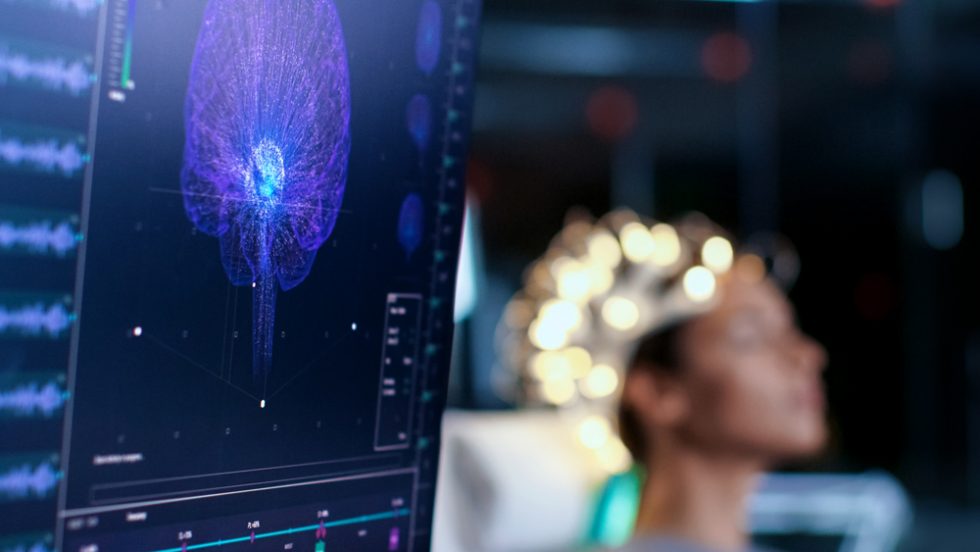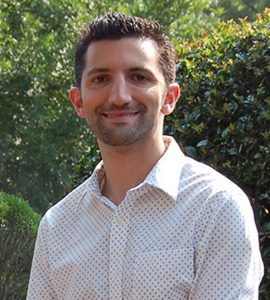
Research illuminates the effects of PTSD on social interaction and relationship maintenance.
For people suffering from post-traumatic stress disorder (PTSD), supportive, intimate relationships can assuage feelings of alienation, boost self-esteem and mitigate guilt—all classic symptoms of the disorder. Yet forming and maintaining these relationships requires something very difficult for many people with PTSD: trust.
The science behind our ability—or inability—to trust one another is a subject of keen interest for Dominic Fareri, PhD, assistant professor of psychology at Adelphi, who was recently named a Rising Star by the Association for Psychological Science for his contributions to research. For the past decade, Dr. Fareri has studied the underlying neural and computational mechanisms by which social interactions shape people’s experiences and decisions. Turning his focus to the relationship between trauma and trust was a natural development.

Dominic Fareri, PhD, studies the way social contexts shape decisions and subjective experiences of incentives, combining behavioral, physiological and multimodal neuroimaging methods with approaches and theory from neuroscience and neuroeconomics.
“Individuals with PTSD tend to exhibit significant interpersonal difficulties and have a hard time developing and maintaining social relationships, which depend on the exchange of trust,” Dr. Fareri said. Because PTSD sufferers’ basic appraisal mechanisms often function atypically as a result of their traumatic experiences, he speculated, they may not be able to accurately evaluate other people as trustworthy or not.
To explore this hypothesis, Dr. Fareri collaborated with colleagues at Rutgers University and The City College of New York on a research project led by Tanya Saraiya, PhD, who received her doctorate from Adelphi in 2020. Project participants across three categories—those with high levels of post-traumatic stress symptoms, those with low levels of post-traumatic stress symptoms and healthy control subjects—were asked to assess the trustworthiness of three different expressions on the same face. During the experiment, the participants’ brain activity was monitored via electroencephalography (EEG) to assess brain activity when participants were making trustworthiness judgments.
The team published its results as “The social cognitive appraisal of trustworthiness in individuals with dimensional levels of post-traumatic stress symptoms: A translational study” in the European Journal of Psychotraumatology in November 2019. They found that people with high levels of symptoms deemed the untrustworthy faces more untrustworthy than the other participants did. Furthermore, both high and low levels of post-traumatic symptoms correlated with increased electrical activity in the brain compared to the healthy control subjects. “The increased electrical activity suggests that trauma-exposed individuals may exhibit heightened vigilance for socially threatening stimuli,” Dr. Fareri said.
This heightened vigilance involves both automatic and deliberate processes in the brain. “When we meet someone new, we engage in automatic estimations of their trustworthiness as a way to appraise whether that person might be threatening or safe to approach,” Dr. Fareri said. “Among other regions, this process involves the amygdala, the part of the brain that helps us rapidly evaluate social signals.”
Other brain regions—including parts of the brain’s reward circuit, such as the striatum—also play a role in the decision to trust. “The striatum generally helps us learn about the reward value of stimuli in the environment,” Dr. Fareri noted. “In this context, the striatum can clue us in to someone’s reputation for trustworthiness, based on trial and error in social interactions.” When someone we choose to trust reciprocates that trust and treats us well in return, engagement of the striatum increases.
This simplified picture of brain processes shows the biological mechanisms by which past experiences inform a person’s decision to trust. “When we meet a new person, we look for evidence that confirms expectations based on prior experience,” Dr. Fareri said. In other words, a bad social experience—or a trauma—can make it very difficult to trust new people. But the closer we are to a person, the more rewarding an experience of reciprocated trust can feel. Dr. Fareri believes his conclusions provide a useful baseline for other researchers studying social interaction and relationship maintenance challenges faced by people with PTSD, autism spectrum disorders and borderline personality disorder, among other conditions.
Dr. Fareri’s next research project follows a similar through line. Recently, he received a grant from the National Institute of Mental Health to investigate how social support informs value-based decision-making. He hopes to discover how people’s preferences for social interaction might change after experiencing acute negative social interactions, as well as how risk-taking behavior might vary across different social contexts. This avenue of study could provide crucial insight into the correlation between our social contexts and the thousands of decisions we make every day.
Saraiya, Tanya, Dominic Fareri, Teresa López-Castro, Denise Hien, Eric Fertuck, and Robert Melara. “The social cognitive appraisal of trustworthiness in individuals with dimensional levels of post-traumatic stress symptoms: A translational study.” European Journal of Psychotraumatology, vol. 10, iss. 1, 29 Nov. 2019.